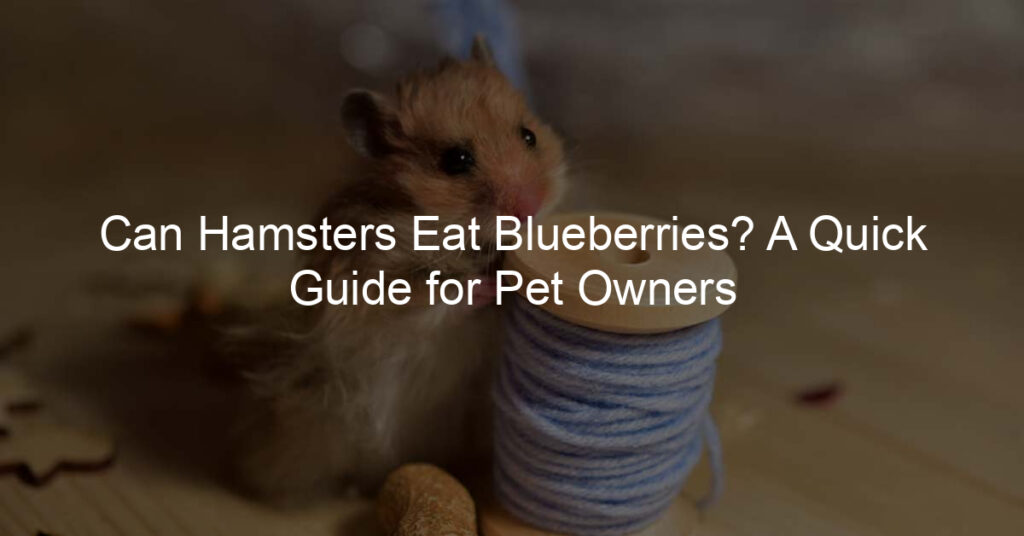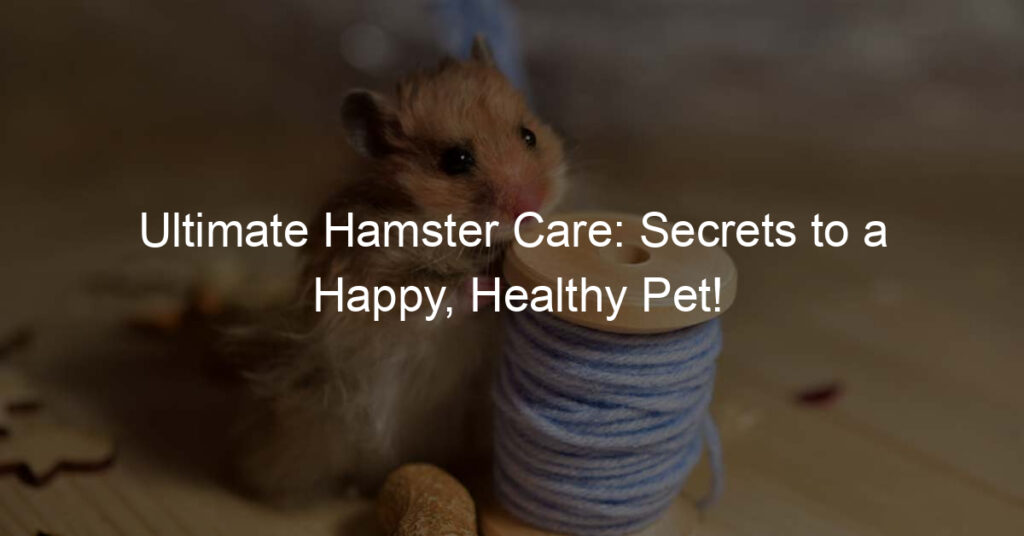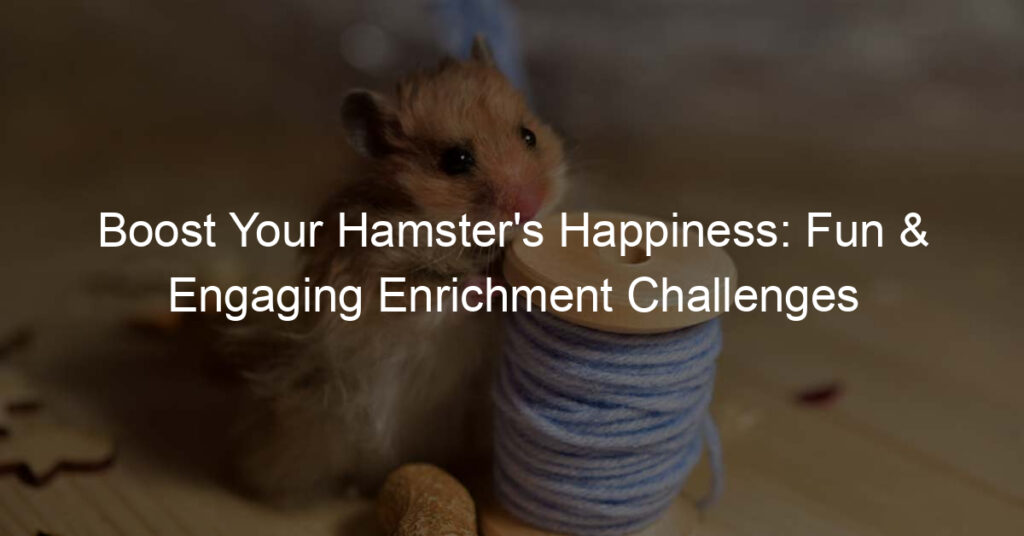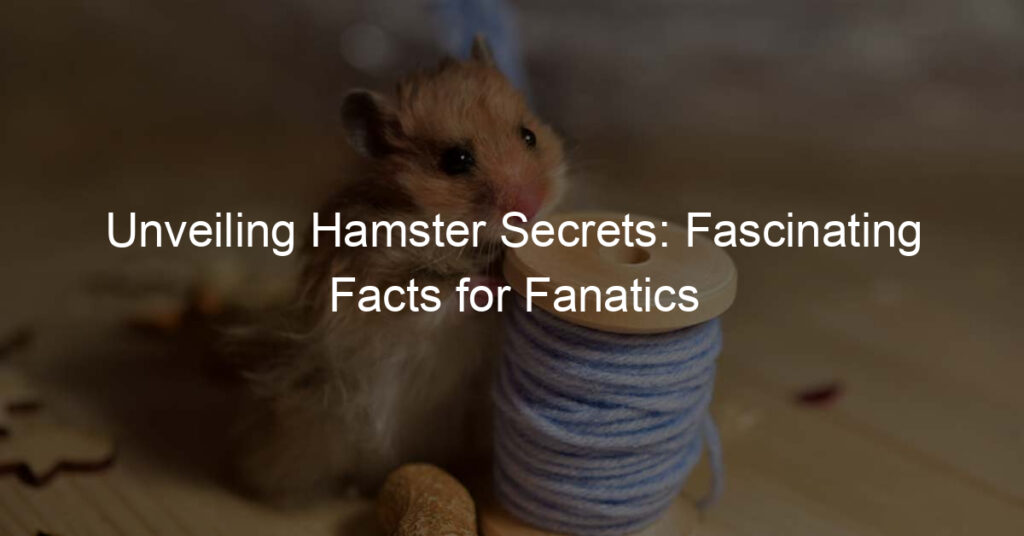As pet owners, we often want to ensure our furry friends are enjoying a variety of flavors and receiving proper nutrition.
For hamster enthusiasts, one such question that may arise is whether can hamsters eat blueberries.
While variety is essential for a well-rounded diet, it’s crucial to understand which foods are suitable for hamsters and which should be avoided.
Blueberries can be a delightful treat for hamsters, offering antioxidants, fiber, and essential vitamins like A, C, and K.
Nevertheless, moderation is key when feeding blueberries to your hamster, as they also contain sugar, which might cause health issues like diabetes and gastrointestinal problems if given excessively.
To ensure you’re providing the right amount of this tasty fruit, it’s helpful to follow certain feeding guidelines tailored to your hamster’s needs.
Key Takeaways
- Hamsters can safely eat blueberries as they provide valuable nutrients
- It’s crucial to feed your hamster blueberries in moderation to avoid health issues
- Following proper feeding guidelines can ensure a balanced and healthy diet for your pet
Understanding Hamster’s Diet
Hamsters are small, adorable creatures that make for wonderful pets. When it comes to their diet, it’s essential to know that hamsters are omnivores. This means that they eat a mix of plant-based foods and insects.
One of the primary components of a hamster’s diet should be high-quality pellets specifically made for hamsters. These pellets are typically made from a mixture of grains, seeds, nuts, and dried vegetables, providing a balanced foundation for their nutrition needs.
In addition to pellets, hamsters can benefit from a diverse diet that includes fruits, vegetables, seeds, and nuts. A variety of plant-based foods can provide essential vitamins and minerals, such as Vitamin C and dietary fiber, to keep your hamster healthy and happy.
Be sure to wash any fresh produce thoroughly before offering it to your pet, as pesticides and other contaminants can be harmful to their health.
In the wild, hamsters also consume insects, such as mealworms and crickets, which are good sources of protein. Though not necessary for a pet hamster, you can occasionally offer these insects to mimic their natural diet and provide them with a protein boost.
It is crucial to control the portion sizes of fruits, vegetables, seeds, nuts, and insects to avoid overfeeding your hamster. Moderation is key as excessive amounts of these foods can lead to health issues such as obesity and diabetes.
Seed mix is another popular option for hamsters, but it should be given in moderation and never as the primary source of nutrition. This is because hamsters may selectively eat their favorite bits, leading to an unbalanced diet.
Good-quality hamster pellets remain the safest and most reliable option for ensuring a well-rounded diet.
A good understanding of a hamster’s diet, including knowing the appropriate balance of pellets, fruits, vegetables, seeds, nuts, and insects, is essential for keeping your pet healthy and thriving.
Be sure to keep the diet diverse but always in moderation to ensure your hamster remains in tip-top shape.
Fruits in Hamster’s Diet
Hamsters, being omnivores, can enjoy a variety of fruits and other natural food sources. Including fruits in their diet is not only healthy, but it also adds variety and enriches their eating experience.
Berries such as blueberries, blackberries, and raspberries are safe for hamsters to eat in moderation. Blueberries, in particular, can be a great treat for your furry friend because they are low in calories and sugar and contain several nutritional benefits.
Nonetheless, always ensure to wash them thoroughly before feeding to remove any pesticides or dirt.
Besides berries, hamsters can also enjoy other fruits like bananas, strawberries, and even melon in small amounts. Bananas and strawberries can be high in sugar, so it’s advised to offer them occasionally as treats and never as their main diet.
Aside from fruits, hamsters can benefit from a diet consisting of veggies and greens, such as carrots, cucumbers, and leafy greens. Vegetables provide essential nutrients and fiber, which aid in digestion and overall health.
Regardless, it is important to introduce any new food gradually and observe how your hamster reacts to it.
Incorporating a diverse range of fruits, vegetables, and greens can help ensure a balanced and healthy diet for your hamster. Just remember to keep portions small and not to overfeed them with these treats.
Providing fresh water, quality seeds, and grains should also form the base of their diet, keeping your hamster happy and healthy.
Feeding Blueberries to Hamsters
Feeding blueberries to hamsters can be a great way to offer them a healthy and tasty treat. Blueberries are packed with beneficial nutrients, such as fiber, antioxidants, and vitamins, making them a suitable occasional snack for your furry friend.
However, because they also contain sugar, it’s essential to exercise portion control and moderation when giving blueberries to your hamster.
Blueberries are best served as an occasional treat, perhaps once or twice a week. As they have a high sugar content, feeding them too often can lead to health issues for your hamster.
Blueberries also have some water content, which could make your hamster’s diet too watery if fed in large quantities, potentially leading to diarrhea or a messy cage.
When feeding blueberries to your hamster, it’s crucial to choose fresh blueberries. Avoid giving them dried or sugared blueberries, as they can be too high in added sugar and not as beneficial to your pet’s health.
Be sure to wash the blueberries thoroughly to remove any pesticide residue or dirt before feeding them to your hamster.
As for the serving size, a single small blueberry or a tiny portion of a larger blueberry is typically sufficient. This will help prevent overfeeding your hamster and keep their sugar consumption under control.
If you have a dwarf hamster, try cutting the blueberry into smaller pieces to suit their size.
Blueberries can be a delightful and nutritious treat for your hamster when fed in moderation and with consideration for their sugar content.
By following these guidelines and maintaining portion control, you can offer your hamster a little burst of flavor and nutrients while keeping them healthy and happy.
Health Benefits of Blueberries for Hamsters
Blueberries are not only a tasty treat, but they also provide numerous health benefits for hamsters. They are packed with essential vitamins, nutrients, and antioxidants that contribute to your pet’s overall well-being.
One of the most significant benefits of blueberries for hamsters is their antioxidant content. Antioxidants are substances that help neutralize harmful free radicals in the body, which can cause cell damage and lead to various health issues.
Consuming antioxidants, hamsters can maintain better overall health and prevent some potential health problems.
Blueberries also contain a variety of important vitamins that are beneficial for hamsters. These include vitamin C, vitamin K, vitamin A, and vitamin B6.
Vitamin C is essential for maintaining a healthy immune system and supporting tissue repair.
Vitamin K plays a vital role in blood clotting and bone health.
Vitamin A promotes healthy vision, while vitamin B6 is essential for brain function and the production of red blood cells.
In addition to vitamins, blueberries are rich in other essential nutrients such as fiber, minerals, and protein. Dietary fiber helps support healthy digestion by regulating bowel movements and preventing constipation.
The minerals in blueberries, such as potassium and manganese, contribute to overall health by supporting vital bodily functions like muscle contraction, heart function, and cellular energy production.
Protein is also essential for building and repairing body tissues.
Some other important micronutrients found in blueberries are vitamin B vitamins, such as folate, and trace elements like manganese. Folate is essential for DNA synthesis and cell division, while manganese serves as a cofactor for several enzymes involved in metabolism and the synthesis of proteins.
Blueberries provide a range of health benefits for hamsters, making them a nutritious addition to their diet. Keep in mind that moderation is key, as excessive consumption of blueberries can lead to high sugar intake and potential health issues.
A well-balanced diet, combined with appropriate portions of blueberries, ensures that your hamster enjoys not only the taste but also the many benefits of this little fruit.
Risks and Precautions When Feeding Blueberries to Hamsters
When feeding blueberries to hamsters, it is important to be aware of the risks and necessary precautions. Blueberries contain sugar and have a high sugar content, which, if consumed in large quantities, could lead to health issues such as diarrhea, obesity, and an unhealthy digestive system in hamsters.
To minimize the risks, it’s best to provide small amounts of blueberries as an occasional treat rather than a staple food. The seeds found in blueberries might cause hamsters to become bloated or experience digestive issues, so it’s best to remove the seeds before feeding them to your pet.
In addition to high sugar content, blueberries may contain traces of pesticides. Washing the blueberries thoroughly before offering them to your hamster can minimize the risk of exposure to these chemicals.
Obesity and excess weight can increase cholesterol levels and lead to health concerns in hamsters. Limiting the amount of blueberries given as treats can help prevent overweight issues and maintain their overall health.
As with any new food introduced to your hamster’s diet, monitor for potential allergic reactions or other adverse effects.
Finally, blueberries can pose a choking hazard, especially for smaller hamsters. Cutting the blueberries into smaller pieces can reduce this risk and make it easier for them to eat and enjoy.
By taking these precautions and adhering to proper feeding guidelines, hamsters can safely enjoy blueberries in moderation without the negative impacts of high sugar content and other potential risks.
Alternatives to Blueberries for a Balanced Hamster Diet
While blueberries can be a delicious treat for your hamster, it’s important to remember that moderation is key. Incorporating a variety of other fruit and veggie alternatives into their diet can ensure a well-balanced meal plan for your furry friend.
With hamsters, it is crucial to provide a well-rounded diet that includes pellets, fresh fruits, vegetables, nuts, and grains. Pellets should be the primary food source, as they contain essential nutrients necessary for a healthy and well-functioning hamster.
Supplementing pellets with controlled portions of fresh fruits and veggies will ensure optimal health and happiness.
Some alternative fruits to blueberries that hamsters can enjoy in moderation include:
- Strawberries
- Raspberries
- Banana
- Apple (remove seeds)
When selecting vegetables for your hamster’s diet, consider providing a nutritious mix of choices such as:
- Carrots
- Kale
- Spinach
- Cucumber
- Broccoli
Additionally, offering a selection of nuts, grains, and seeds can enrich your hamster’s balanced diet.
Examples of such food items include:
- Sunflower seeds
- Almonds (unsalted)
- Pumpkin seeds
- Whole wheat bread (in small quantities)
Lastly, don’t forget about the importance of hydration. Adequate water intake is essential for any pet, including hamsters. Providing fresh, clean water daily will contribute to their overall well-being.
By incorporating these alternative food items into your hamster’s diet, you can offer a diverse range of nutrients while still treating them to their favorite fruits, such as blueberries.
Remember to monitor portion sizes and practice moderation to avoid potential health issues caused by excessive sugar consumption. A well-balanced diet paired with proper hydration will ensure your hamster thrives and maintains optimal health.
Special Considerations for Different Types of Hamsters
When it comes to feeding blueberries to hamsters, knowing your hamster’s specific breed and age can make a difference. Let’s discuss the special considerations for baby hamsters, Syrian hamsters, and dwarf hamsters when it comes to blueberries and their dietary needs and behavior.
Baby hamsters are still developing and growing, so their nutritional needs are different from adult hamsters. While an adult hamster can enjoy blueberries in moderation as a treat, baby hamsters should focus on a diet primarily consisting of pellets, seeds, and some leafy green vegetables.
Introducing blueberries too early might cause digestive issues, so it’s best to wait until their system is more developed before sharing this treat with them.
Syrian hamsters, also known as golden hamsters or teddy bear hamsters, are larger than dwarf hamsters, which may affect the amount of blueberries they can safely consume.
Although both types of hamsters can enjoy blueberries in their diets, the size difference implies that a Syrian hamster could potentially handle slightly more blueberries than a dwarf hamster. However, moderation is still key, as too much of any fruit can lead to health issues.
Dwarf hamsters, including Roborovski, Campbell’s, and Winter White, are smaller in size and have slightly different dietary needs compared to Syrian hamsters. Since they have a higher risk of developing diabetes, it is essential to monitor their sugar intake closely.
Offering blueberries occasionally and in minimal quantities can help ensure dwarf hamsters receive the nutritious benefits without increasing their risk for health problems.
In terms of behavior, some hamsters might prefer different treats or be less interested in blueberries. Each hamster’s preferences can be unique, so it is essential to observe your pet’s reaction to blueberries and adjust their diet accordingly.
Remember that the dietary needs of all types of hamsters primarily consist of pellets and seeds, complemented by fresh vegetables and fruits.
Blueberries can be a delightful treat for any breed of hamster when provided in moderation and according to their specific needs.
Blueberry-Flavored Hamster Foods and Treat Choices
When looking for blueberry-flavored treats for your hamster, it’s important to be mindful of the ingredients and nutritional content. Many commercial treats may contain added sugars or artificial flavors, which can be harmful to your hamster’s health.
In this section, we will discuss some of the common blueberry-flavored options and their suitability for your hamster.
Blueberry Muffins: Although blueberry muffins might seem like a delicious treat for your furry friend, they are not a suitable option for hamsters. The high sugar content and added ingredients, such as flour, can be potentially harmful to their health. Instead, stick to offering fresh blueberries in moderation as a natural and healthier alternative.
Blueberry Jam: Similar to muffins, blueberry jam is also not recommended for hamsters. The high sugar content, along with added preservatives, can be detrimental to your hamster’s well-being. It is best to avoid offering any kind of jam or preserves as a treat to your hamster.
Blueberry Juice: While blueberry juice might seem like a natural and tasty option, it should not be given to hamsters. Juice, even when made from pure fruit, contains a concentrated amount of sugar which can be harmful to your hamster. Additionally, they might struggle to drink the liquid due to its consistency. Stick to providing fresh water as the primary source of hydration for your hamster.
To offer your hamster an appropriate blueberry-flavored treat, look for commercial products specifically designed for hamsters and ensure that the ingredients are safe.
Some options include hamster-safe blueberry-flavored pellets or treats made with natural ingredients. Always read the product labels and consult your veterinarian for advice on offering treats to your hamster.
Remember, moderation is key when it comes to offering treats to your hamster. While fresh blueberries can be a healthy treat option when given in small amounts, it’s essential to maintain a balanced and nutritious diet for your furry friend.
Frequently Asked Questions
Are blueberries safe for hamsters?
Yes, blueberries are safe for hamsters when given in moderation. They are a good source of vitamin C and antioxidants, which can benefit your hamster’s health.
How many blueberries can a hamster have?
It’s essential to provide blueberries to your hamster as an occasional treat and not a regular part of their diet. Offer one or two small blueberries once or twice a week, ensuring not to overfeed them.
Can hamsters eat other berries like strawberries?
Hamsters can enjoy other berries, such as strawberries, raspberries, and blackberries, in moderation. These fruits provide essential nutrients and antioxidants for your hamster when given in small quantities.
However, always remember to remove any seeds and wash the berries thoroughly before feeding.
Is it okay to give a hamster frozen blueberries?
While it might be tempting to give your hamster frozen blueberries, it’s best to avoid this. Frozen fruits can cause digestive problems for your pet. Instead, opt for fresh or thawed blueberries that are at room temperature.
Are there any fruits hamsters should avoid?
Hamsters should avoid fruits with high sugar content, such as grapes and raisins, as they can lead to obesity and other health issues. Additionally, avoid fruits with large seeds or pits, like cherries and peaches.
Always research before introducing any new fruit into your hamster’s diet.
What other fruits can hamsters enjoy?
Hamsters can enjoy various fruits in moderation, such as apples, bananas, and pears. These fruits provide essential nutrients and can make a tasty treat for your pet. Remember always to remove any seeds and wash the fruits thoroughly before feeding them to your hamster.








